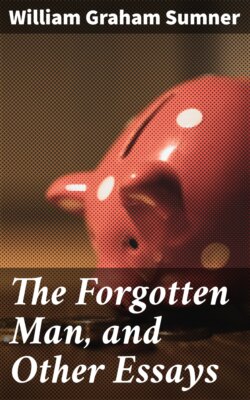Читать книгу The Forgotten Man, and Other Essays - William Graham Sumner - Страница 46
На сайте Литреса книга снята с продажи.
(H) That Farmers Gain by Protection, because it Draws so many Laborers out of Competition with them.
Оглавление121. Since the farmers pay the taxes by which this operation is supposed to be produced, a simple question is raised, viz., how much can one afford to pay to buy off competition in his business? He cannot afford to pay anything unless he has a monopoly which he wants to consolidate. Our farmers are completely open to competition on every side. The immigration of farmers every three or four years exceeds all the workers in all the protected trades. Hence the farmers, if they take the view which is recommended to them, instead of gaining any ground, are face to face with a task which gets bigger and bigger the longer they work at it. If one man should support another in order to get rid of the latter’s competition as a producer, that would be the case where the taxpayer supports soldiers, idle pensioners, paupers, etc. A protected manufacturer, however, by the hypothesis, is not simply supported in idleness, but he is carrying on a business the losses of which must be paid by those who buy off his competition in their own production. On the other hand, when farmers come to market, they are in free competition with several other sources of supply. Hence, if they did any good to agricultural industry by hiring the artisans to go out of competition with them, they would have to share the gain with all their competitors the world over while paying all the expense of it themselves.
122. The movement of men over the earth and the movement of goods over the earth are complementary operations. Passports to stop the men and taxes to stop the goods would be equally legitimate. Since it is, once for all, a fact that some parts of the earth have advantages for one thing and other parts for other things, men avail themselves of the local advantages either by moving themselves to the places, or by trading what they produce where they are for what others produce in the other places. The passenger trains and the freight trains are set in motion by the same ultimate economic fact. Our exports are all bulky and require more tonnage than our imports. On the westward trip, consequently, bunks are erected and men are brought in space where cotton, wheat, etc., were taken out. The tariff, by so much as it lessens the import of goods, leaves room which the ship owners are eager to fill with immigrants. To do this they lower the rates. Hence the tariff is a premium on immigration. The protectionists have claimed that the tariff does favor immigration. But nine-tenths of the immigrants are laborers, domestic servants, and farmers.23 Probably more than one-third of the total number, including women, find their way to the land. As we have seen, the tariff also lowers the profits of agriculture, which discourages immigration and the movement to the land. Therefore, if the farmer believes what the protectionist tells him, he must understand that the taxes he pays bring in more people, and raise the value of land by settling it, and that they also bring more competition, which the farmer must buy off by lowering the profits of his own (the farming) industry. Then, too, so far as the immigrants are artisans, the premium on immigration is a tax paid to increase the supply of labor, that is, to lower wages, although the protectionists say that the tariff raises wages. Hence we see that when a tax is laid, in our modern complicated society, instead of being a simple and easy means or method to be employed for a specific purpose, its action and reaction on transportation, land, wages, etc., will produce erratic, contradictory, and confused effects, which cannot be predicted or analyzed thoroughly, and the protectionist, when he pleads three or four arguments for his system, is alleging three or four features of it which, if properly analyzed and brought together, are found to be mutually destructive, and cumulative only as to the mischief they do (see §§29, 101).
